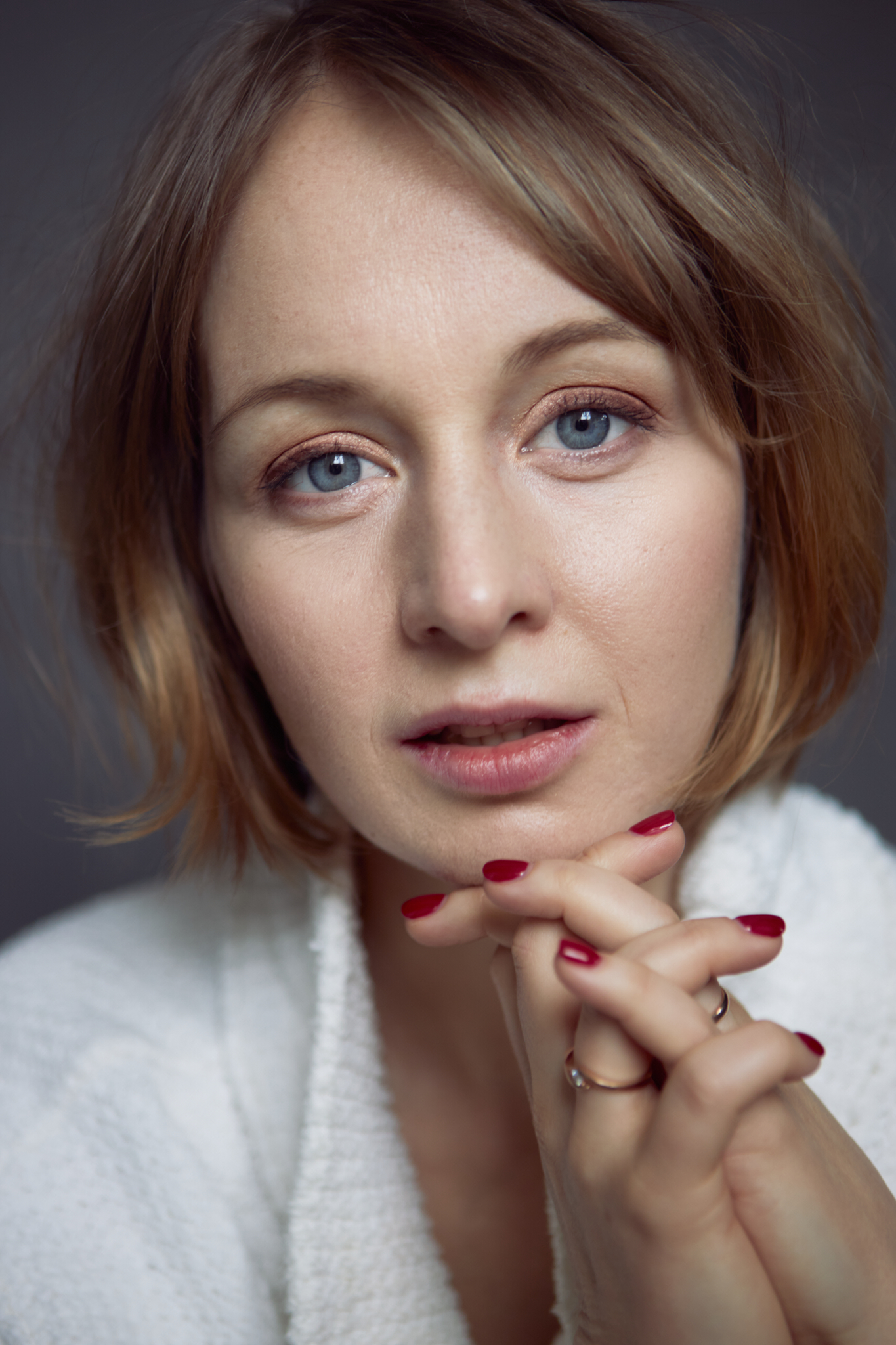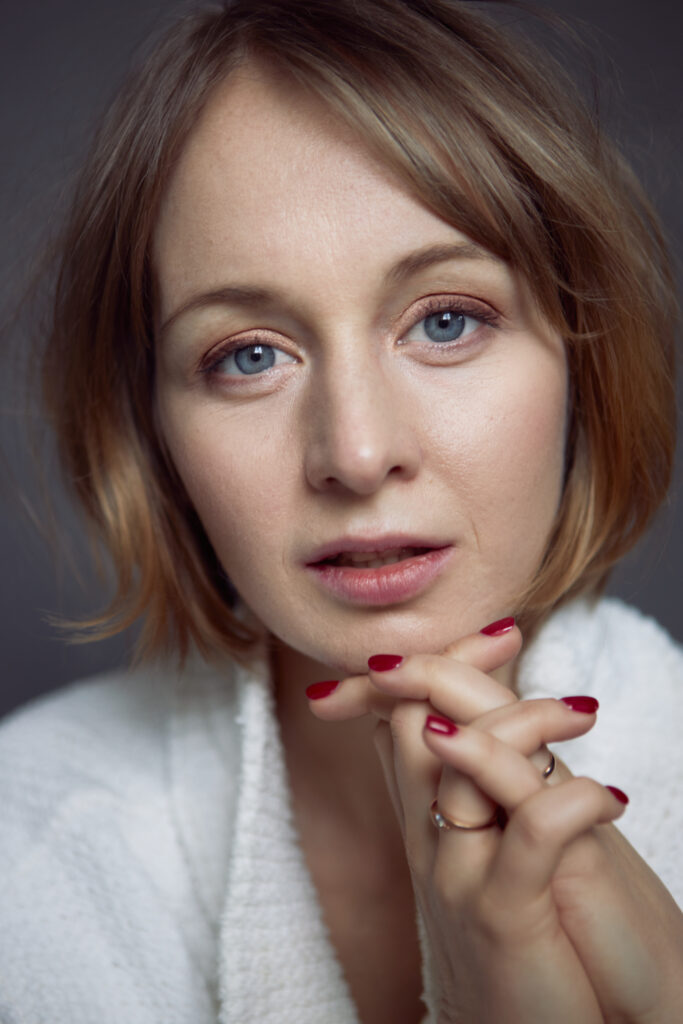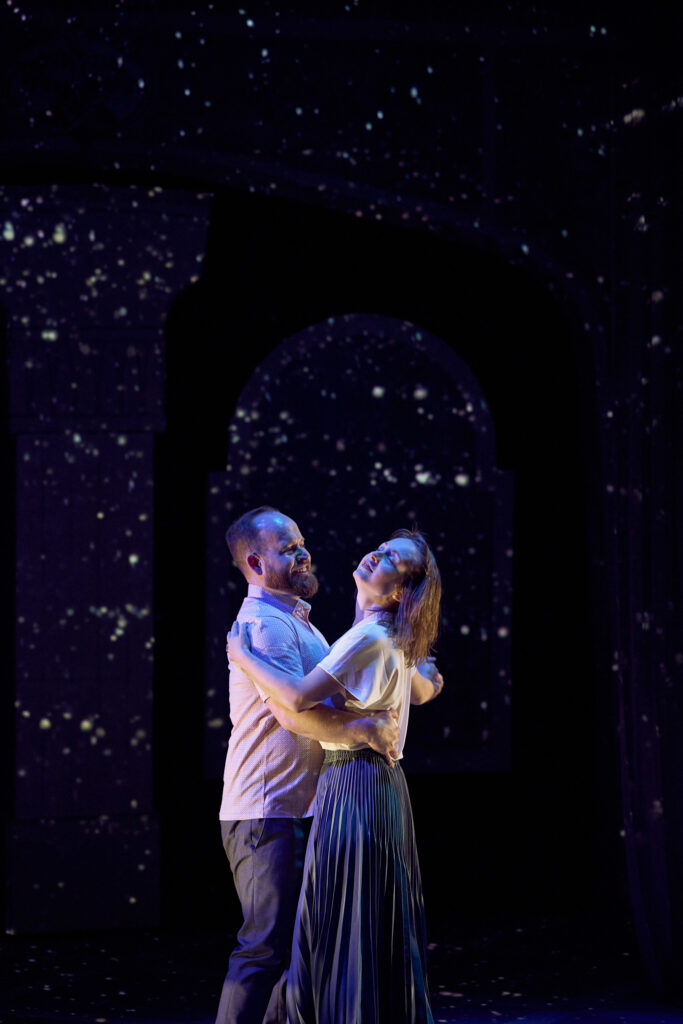

First Métis Man of Odesa has become one of the most popular plays in Canadian history, finding love wherever it tours across the country. The production is back again in Toronto at Soulpepper Theatre until May 19. Its first Toronto run scooped up three Dora Awards for Outstanding New Work, Outstanding Production, and Outstanding Direction. (See my rave review here. https://www.ludwig-van.com/toronto/2023/04/07/scrutiny-three-productions-light-toronto-stages-april/).
The endearing play tells the complicated love story of Canadian Métis playwright Matt MacKenzie, and Ukrainian actor Mariya Khomutova, as written and performed by the couple. In this interview, we get to meet Khomutova, 37, up close and personal, as well as explore the backgound of the play, and hear the actor’s anguished thoughts about her beleaguered country.
As utterly charming as Khomutova is in First Métis Man of Odesa, she is even more so in person. This was one of my favourite zoom interviews of all time.
What is your background and how did you become interested in theatre?
I was born in Odesa in 1987, and grew up there. I was a very simple teenager, crazy about music videos from the West like the Spice Girls and the Back Street Boys. I studied English because I thought I might become an interpreter.
I got interested in acting because I fell in love with a Russian movie star. I’d rather not mention his name because I think he supports the Russian invasion. I became fascinated by his films – how did he train to play different characters – so I started taking acting classes at the Palace of Youth when I was 13. That made me a nerd at my high school because I just went to acting classes and listened to music. My parents were very surprised by my interest in theatre, but they were also very supportive of my desire to become an actor.
When did your formal theatre training begin?
After high school, like everyone else in Ukraine who wanted to be an actor, I went to Russia. That was the prevailing thought – that Russia was the only place to train. I auditioned for theatre schools in St. Petersburg but didn’t get in, so I came back to Ukraine.
The most famous acting teacher at the Theatre University in Kyiv was Nicolai Rushkovsky who had direct links back to the Moscow Art Theatre and Stanislavsky. You could only audition for his course every four years. He took people in, and trained them for four years, then started the course again. It was the most prestigious place to study theatre in Kyiv. I had to wait three years until the next audition, but I wanted to study with him so badly, I was willing to wait.
What did you do in the meantime?
I came back to Odesa, and became an unofficial student at the university, where I audited courses in philosophy, anthropology, and theories of history. My parents were happy to fund this because at least I wasn’t into drugs and on the street.
At the same time, I went to performances at both the Ukrainian and Russian Theatres almost every night. I found the Ukrainian theatre more exciting because they experimented, while Russian theatre was more predictable and literal.
One impressive Ukrainian play that I saw – Ukrainian Decameron by director Vlad Troitsky – had the audience sitting on the stage while the actors were on a rotating platform. It was interactive theatre because they were so close to me. There was no fourth wall. I also admired the productions by director Dmitri Bogomazov which were Ukrainian classics done with a contemporary vibe.
I do admit, however, that I was in limbo in this Odesa period of my life.
And then it was on to Kyiv and Rushkovsky.
I was 20 years old, and the upper limit for women to get into the Theatre University was 21. For men it was 26. If Rushkovsky hadn’t taken me, I don’t know what would have become of me.
I presume that when you finished your four years with Rushkovsky, you began your professional acting career.
I started to audition for both the Ukrainian and Russian language theatres, and ultimately joined a repertory company. By 2018, I was a freelance actor, auditioning for productions that interested me.
And then Matthew MacKenzie came into your life.
A Kyiv local company, Dikyi Theatre, put out a call for actors who spoke English. The pay was $300 for a week’s workshop, which had been my salary for a whole month. I jumped at the chance.
They were hosting Edmonton-based, Canadian-Ukrainian playwright/director Lianna Makuch, her husband, director Patrick Lundeen, and dramaturge Matt Mackenzie, in a reading of Lianna’s new play. She had been researching her Ukrainian roots by the team interviewing people in small villages all over the country. They even went into the Donbas region where Russian separatists had been fighting a civil war since 2014.
We were six Ukrainian actors, and we read and discussed the play together with the Canadians. The team wanted to hear our reactions to the Ukrainian voices in Lianna’s play, which was initially called The Blood of Our Soil, but later became simply Barvinok, which means garden. We then put on a staged reading in English.
In fact, the first line of First Métis Man of Odesa, is the first line from Barvinok. Lianna also directed our play.
What was the wellspring behind the First Métis Man of Odesa?
Its first incarnation was Matt’s 20 minute, light and romantic version that ended with the birth of our son Ivan. Then Russia invaded Ukraine in 2022, and Matt said, the story isn’t finished. It has to continue, and he couldn’t write the second part without me.
What did you feel about becoming co-writer of this expanded version?
I told Matt that I couldn’t do it. I was very depressed and I felt guilty that I was in Canada, while my family and friends were in a war zone, and I wasn’t there witnessing what they were going through. He told me to write a diary about my feelings, and I felt better getting it out of my system. I shared the diary with Matt and he structured the material into the second half of the play which includes other stories besides our own.
First Métis Man of Odesa is going to be retired after the current Toronto and Ottawa performances. What’s next for you?
I have a residency at Driftwood Theatre where I’m working on a solo show. The theme is about being a new Canadian and losing my motherland. I’m exploring uprooted space.
I said in my review of First Métis Man of Odesa that it was very clear you had classical training. I thought you were a wonderful actor. Are you pursuing that aspect?
I’m currently looking for representation. I’m hoping that our play is the kick start to my acting career here in Canada.
You’ve relocated to Toronto from Edmonton.
We left Edmonton after our son Ivan was born. Toronto is my town for sure. I love a big city and being surrounded by tall buildings. I do have one sadness though. I was disappointed in Canada’s response to Ukrainian artists.
What do you mean?
After the Russian invasion, Europe opened its doors to give Ukrainian artists opportunities to express themselves, while Canada did nothing. Finally playwright/director/activist Andrew Kushnir organized readings of Ukrainian plays at Stratford, and directed the Ukrainian play Bad Roads at Crow’s Theatre, while Matt and I did First Métis Man of Odesa. Andrew also wrote an article about how Toronto keeps putting on Russian plays, while there are so few Ukrainian voices. I always loved Russian culture but I see the invasion of Ukraine as a betrayal.
And yet Odesa was always thought of as a Russian city.
That changed with the breakup of the Soviet Union in 1991. Ukrainian became the official language of the new independent country and Odesa adopted that policy. When the civil war broke out in the Donbas in 2014, Odesa supported the Ukrainian side. We saw it as Russian-backed provocateurs against Ukrainian patriots. It used to be that Ukrainian artists wanted to seek their fame and fortune in Russia, but that was no longer the case.
How do you see the present war playing out?
I can’t predict the future, but I know all about Russian persistence in getting their goals. I’m afraid that Ukraine will finally be forced to go to negotiations. There have been huge losses and the best of our warriors are dead. Ukraine will be faced with impossible choices and will have to give Putin what he wants. Russia will get to keep Crimea and the Donbas – Donetsk and Luhansk.
Putin also really wants the port of Odesa and is now bombing the city. I speak to my father and he tells me everyone is tired and exhausted, and yet he doesn’t want to leave. Odesa is his home.
And any promises Putin might make about the independence of the rest of Ukraine will be broken. Even if they get rid of Putin, I believe Russia will still carry on the war.
That is a very bleak picture.
We do live in disturbing times, yet, there is always hope. That the US Congress will send more weapons. That other countries from abroad will continue to help. That the world will see that humanistic values are important. That like fairy tales, good things will always win.

